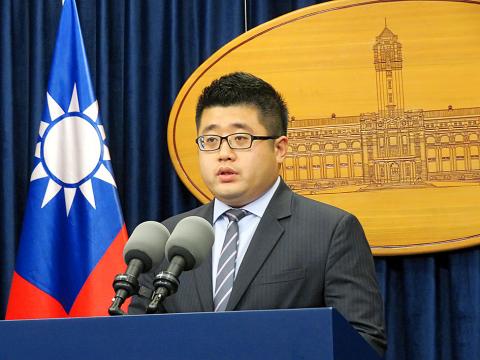The Presidential Office yesterday expressed gratitude to the US for its concern over China’s request to US and international airlines to change how they refer to Taiwan, while Washington’s action drew mixed response from others in Taiwan.
Taiwan would continue to support and strive for regional stability and cross-strait peace, despite Beijing’s constant efforts to suppress its international space, Presidential Office spokesman Sydney Lin (林鶴明) said.
The White House on Saturday issued a statement denouncing China’s demand that US and foreign airlines change how they identify Taiwan, Hong Kong and Macau on their Web sites.

Photo: Lee Hsin-fang, Taipei Times
The statement came after the Chinese Civil Aviation Administration on April 25 sent a letter to American Airlines, United Airlines and 24 other airlines, enjoining them to remove all descriptions of Taiwan as a country from their Web sites and promotional materials.
Ministry of Foreign Affairs spokesman Andrew Lee (李憲章) yesterday said China’s efforts to control private firms in other countries was “arbitrary and ill-intentioned.”
The international community must take the issue seriously and have the courage to defy such unreasonable demands, he said.
However, Chinese Nationalist Party (KMT) Legislator Lee Yen-hsiu (李彥秀) said that while it might appear that US President Donald Trump is defending the sovereignty of the Republic of China, anything Trump does has the US’ interests as his priority.
The US and China are competing against each other, and Taiwan could easily become the US’ chess piece, the lawmaker said.
Alexander Huang (黃介正), an associate professor at Tamkang University’s Graduate Institute of International Affairs and Strategic Studies, said that for the US, China asking US-based airlines to remove “Taiwan” from lists of countries is considered interference in its internal affairs.
“Eighty percent of the US’ reaction is due to the US’ consideration of itself as a great power and only 20 percent is a friendly gesture to Taiwan,” cable news channel TVBS quoted Huang as saying.
In related news, Josh Rogin, a columnist who covers foreign policy and national security for the Washington Post, Bloomberg and Foreign Policy magazine, in an online article on Saturday on the Post’s Web site said the Civil Aviation Administration’s letter “mischaracterizes US government policy by saying ‘the one-China policy of your government.’”
“The United States does not have a one-China policy. Washington acknowledges Beijing’s position that there is one China that includes Taiwan and the United States takes no stance on that question. The US government is not going to agree that Taiwan is part of the People’s Republic of China, and neither should American companies,” Rogin wrote.
“The Chinese Communist Party can be forgiven for believing it can use a version of its social credit system on American companies. Nobody has pushed back on this so far. The White House is pledging to start doing that now. It’s a recognition that, as a White House official told me, ‘China is out of control,’” Rogin wrote.

The US government has signed defense cooperation agreements with Japan and the Philippines to boost the deterrence capabilities of countries in the first island chain, a report by the National Security Bureau (NSB) showed. The main countries on the first island chain include the two nations and Taiwan. The bureau is to present the report at a meeting of the legislature’s Foreign Affairs and National Defense Committee tomorrow. The US military has deployed Typhon missile systems to Japan’s Yamaguchi Prefecture and Zambales province in the Philippines during their joint military exercises. It has also installed NMESIS anti-ship systems in Japan’s Okinawa

‘WIN-WIN’: The Philippines, and central and eastern European countries are important potential drone cooperation partners, Minister of Foreign Affairs Lin Chia-lung said Minister of Foreign Affairs Lin Chia-lung (林佳龍) in an interview published yesterday confirmed that there are joint ventures between Taiwan and Poland in the drone industry. Lin made the remark in an exclusive interview with the Chinese-language Liberty Times (the Taipei Times’ sister paper). The government-backed Taiwan Excellence Drone International Business Opportunities Alliance and the Polish Chamber of Unmanned Systems on Wednesday last week signed a memorandum of understanding in Poland to develop a “non-China” supply chain for drones and work together on key technologies. Asked if Taiwan prioritized Poland among central and eastern European countries in drone collaboration, Lin

Renewed border fighting between Thailand and Cambodia showed no signs of abating yesterday, leaving hundreds of thousands of displaced people in both countries living in strained conditions as more flooded into temporary shelters. Reporters on the Thai side of the border heard sounds of outgoing, indirect fire yesterday. About 400,000 people have been evacuated from affected areas in Thailand and about 700 schools closed while fighting was ongoing in four border provinces, said Thai Rear Admiral Surasant Kongsiri, a spokesman for the military. Cambodia evacuated more than 127,000 villagers and closed hundreds of schools, the Thai Ministry of Defense said. Thailand’s military announced that

CABINET APPROVAL: People seeking assisted reproduction must be assessed to determine whether they would be adequate parents, the planned changes say Proposed amendments to the Assisted Reproduction Act (人工生殖法) advanced yesterday by the Executive Yuan would grant married lesbian couples and single women access to legal assisted reproductive services. The proposed revisions are “based on the fundamental principle of respecting women’s reproductive autonomy,” Cabinet spokesperson Michelle Lee (李慧芝) quoted Vice Premier Cheng Li-chiun (鄭麗君), who presided over a Cabinet meeting earlier yesterday, as saying at the briefing. The draft amendment would be submitted to the legislature for review. The Ministry of Health and Welfare, which proposed the amendments, said that experts on children’s rights, gender equality, law and medicine attended cross-disciplinary meetings, adding that